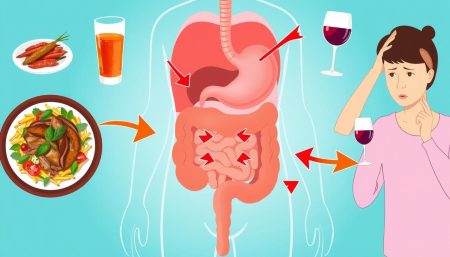What's Hot
- Understanding Metastatic Cancer and Treatment Options
- Understanding Lymphoma Cancer: Symptoms & Treatment
- Don Omar Cancer: Updates on Reggaeton Star’s Health
- Inflammatory Breast Cancer: Causes and Warning Signs
- Early Signs and Kidney Cancer Symptoms to Watch For
- Understanding Sarcoma Cancer: Types and Treatment Options
- Early Signs and Thyroid Cancer Symptoms to Watch For
- Early Signs and Symptoms of Colon Cancer to Know
Acid Reflux
Common Signs & Symptoms of Acid Reflux
Knowing the signs of acid reflux is key to feeling better. This common issue can really disrupt your day. We aim to help you understand the acid reflux symptoms you might face. These symptoms include heartburn, chest pain, and regurgitation.…
Does Milk Help Acid Reflux? A Scientific Look
Many people turn to milk when they feel acid reflux discomfort. But, does milk help acid reflux, or is it just a comforting thought? This question is common among those who suffer from acid reflux’s burning sensation. We’re going to…
Quick Relief Tips: What to Do for Acid Reflux
Feeling the discomfort of acid reflux can really mess up your day. If you’re looking for acid reflux relief, you’re not alone. This article is here to help with quick and effective steps for acid reflux treatment. It’s important to…
Many people search for answers about acid reflux because of its discomfort. Symptoms like heartburn and regurgitated food can disrupt daily life. Knowing what triggers acid reflux is key to managing it and feeling better. For some, acid reflux turns…
Acid Reflux
Dealing with an acidic stomach is more common than you might think. Acid Reflux affects many, making everyday activities and sleep hard. This introduction will help us understand Eesophageal Reflux better. We’ll look at its symptoms, causes, and how to manage it.
Our goal is to help you spot Reflux Disease early. This way, you can know how it affects your life.
What is Acid Reflux and Why Does It Occur?
Acid reflux feels like a burning in your chest and throat. It’s a sign of Gastroesophageal Reflux Disease (GERD). When stomach acid flows back into the esophagus, it’s called Acid Regurgitation. Knowing about this condition starts with understanding how common it is and why it happens.
Defining Acid Reflux and Its Prevalence
Acid reflux is very common, affecting many people at some point. It often causes Heartburn and Acid Indigestion. These symptoms show how widespread GERD can be.
Common Causes Behind Acid Reflux
The main reason for acid reflux is a problem with the lower esophageal sphincter (LES). If the LES doesn’t close right or opens too much, stomach acid goes back up. This can hurt the esophagus and cause discomfort.
The Role of Diet and Lifestyle in Triggering Symptoms
Your diet and lifestyle can make acid reflux worse. Eating spicy or acidic foods can lead to heartburn or acid indigestion. Smoking or lying down after eating also makes symptoms worse. This shows how important it is to make healthy lifestyle choices.
Identifying the Symptoms of Acid Reflux
It’s important to know the Acid Reflux Symptoms to manage this common issue. A key symptom is Heartburn, a burning feeling in the chest. It can even reach up to the throat, causing a lot of pain.
Regurgitation is another sign, where Acidic Stomach contents go back up into your esophagus. Sometimes, they even reach your mouth, leaving a sour taste. This is a clear sign of Esophageal Reflux.
Difficulty swallowing, or dysphagia, happens when stomach acids damage the esophagus. This can lead to scarring and narrowing. It’s a serious symptom that needs early treatment.
These symptoms all point to Acid Reflux. If you notice any of them, it might be a sign of Esophageal Reflux. It’s best to talk to a doctor about it.
Acid Reflux: Diagnosis and Treatment Options
It’s important to know the difference between acid-related conditions. Whether you get occasional heartburn or have symptoms all the time, getting the right care can really help. It can make your life much better.
Differentiating Between Acid Reflux, GERD, and Heartburn
Acid Reflux, GERD, and heartburn are not the same. Acid reflux is when stomach acid flows back into the esophagus, causing pain. GERD is when this happens a lot, and heartburn is the burning feeling in your chest.
Knowing the difference helps doctors find the right Acid Reflux Treatment for you.
When to See a Doctor: Diagnostic Procedures
If you have acid indigestion sometimes, you might not need to see a doctor. But if it keeps happening, you should get checked out. Doctors might do an endoscopy or pH monitoring to see what’s going on.
These tests help doctors come up with a treatment plan just for you.
Treatment Strategies: Medications and Home Remedies
Treating acid reflux and GERD can be done in a few ways. You can take over-the-counter antacids for quick relief. For GERD, doctors might prescribe stronger medicines.
Changing your diet and avoiding certain foods can also help. This can make a big difference in managing Reflux Disease.
Lifestyle Modifications to Manage Reflux Disease
Living with GERD can be tough, but making lifestyle changes helps a lot. One key change is managing your weight. Carrying extra pounds, especially around your belly, puts pressure on your stomach. This can cause acid to flow up into your esophagus.
Regular exercise and a balanced diet can help you lose weight. This can make GERD symptoms happen less often.
Quitting smoking is another big step. Nicotine makes the valve between your stomach and esophagus relax. This lets stomach acid flow up more easily. Stopping smoking can greatly reduce GERD symptoms.
Changing what you eat is also crucial. Avoid foods like chocolate, peppermint, fatty foods, coffee, and alcohol. These can irritate your stomach and make symptoms worse.
The main goal of these changes is to feel better and avoid more discomfort. By watching what you eat, managing your weight, and quitting smoking, you can control your acid reflux. Small changes can make a big difference in your life if you have chronic GERD.
FAQ
Q: What exactly is acid reflux and how common is it?
A: Acid reflux, also known as esophageal reflux or reflux disease, is when stomach acid flows back into the esophagus. This causes discomfort and symptoms like heartburn and acid indigestion. It’s quite common, affecting many people at some point in their lives.
Q: What causes acid reflux to occur?
A: Acid reflux often happens because of a problem with the lower esophageal sphincter (LES). This is the valve between the stomach and esophagus. Being overweight, certain foods, medications, smoking, and stress can also cause it.
Q: Can diet and lifestyle choices trigger acid reflux symptoms?
A: Yes, they can. Eating spicy, fatty, or acidic foods and drinks can trigger symptoms. Lifestyle choices like eating big meals, lying down after eating, smoking, and drinking too much alcohol can also make heartburn worse.
Q: How can I identify if I’m experiencing symptoms of acid reflux?
A: Look out for a burning sensation in your chest (heartburn), acid or bitter taste in your mouth, trouble swallowing, chronic cough, and sore throat. These signs might mean you have acid reflux and need to see a doctor.
Q: What is the difference between acid reflux, GERD, and heartburn?
A: Heartburn is a burning feeling in your chest and throat. Acid reflux is when stomach acid flows into your esophagus. GERD is a chronic, severe form of acid reflux that can lead to health problems if not treated.
Q: When should I see a doctor for my acid reflux symptoms?
A: See a doctor if you have frequent or severe acid reflux symptoms. If over-the-counter meds don’t help, it’s time to get checked. Persistent symptoms could mean GERD or another serious health issue.
Q: What treatment options are available for acid reflux?
A: There are many treatments, from lifestyle changes and home remedies to medications and surgery. Antacids and H2 blockers can help occasional heartburn. For chronic GERD, proton pump inhibitors might be needed. Surgery, like fundoplication, is sometimes an option.
Q: What lifestyle modifications can help manage reflux disease?
A: Making changes like losing weight, eating smaller meals, avoiding trigger foods, quitting smoking, and drinking less alcohol can help. Also, avoid lying down after eating to manage symptoms better.















